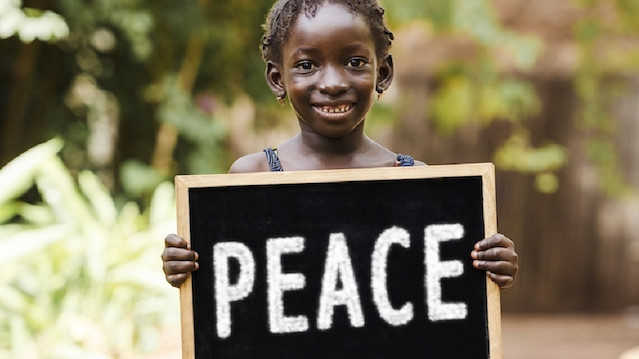
For a change, the African continent saw many positive developments in 2018, reaffirming the new adage 'Africa is rising'.
There were many incidents of peaceful transfer of political power and economic growth on the continent, unlike in the past where Africa was mostly known for incidents of famine, disease and coups.
In February, South Africa’s President Jacob Zuma who had served for nearly a decade was forced to resign by his ruling African National Congress (ANC) party.
His tenure in office had been marred by several accusations of corruption, so the party had no choice but relieve him of his duties or risk losing the 2019 elections.
Zuma’s second term in office as president would have ended in mid-2019. The 76 year-old anti-apartheid activist, resigned without causing chaos.
He was replaced by his former deputy Cyril Ramaphosa who brought in optimism -- promising to fight corruption and unify the nation.
In his 10 months in office, Ramaphosa has been able to attract many investments to Africa’s most industrialized economy with hopes of fighting high unemployment and inequality.
In a bid to end corruption, a judicial commission of inquiry was instituted in 2018, to probe corruption allegations involving Zuma, several government officials and a wealthy Indian family.
In Ethiopia, Prime Minister Hailemariam Desalegn surprised the continent by resigning after protracted anti-government protests.
He was replaced by 42 year-old Abiy Ahmed who has been widely praised for making substantial reforms such as releasing political prisoners, restoring diplomatic ties and re-establishing peace with neighbouring Eritrea which had been at loggerheads with Ethiopia for many years.
For some time, Ethiopia had been viewed as an authoritarian state that did not tolerant opposing views, but within months of Ahmed’s election the picture has changed.
Africa’s youngest leader has allowed exiled members of the opposition to return home and has opened new political space for dialogue.
In a bid to strengthen gender equality, the country has also elected many female leaders including its first female President Sahle-Work Zewade, Electoral Commission head and a Supreme Court Judge.
In Nigeria, 2018 saw a curious spike in Boko Haram activities after months of relative calm which had inspired the army and the government to declare what analysts called a ‘hurried’ victory in the eight-year insurgency.
In February, militants from the Abu Musab Al-Barnawy faction of Boko Haram abducted some 110 schoolgirls from a government school in northeast Dapchi town. This was an embarrassing repeat of the mass abduction of some 276 schoolgirls in Chibok town four years ago.
The year also saw the abduction and killing of some police officers, midwives and nurses working for the United Nations children’s agency UNICEF and the Red Cross.
Officials said 2018 recorded one of least Boko Haram deaths and suicide bombings on civilian populations since the crisis which attracted global attention in 2013.
For the first time casualties from clashes between herders and farmers surpassed the killings in the insurgency-wracked northeast.
On the political front, President Buhari’s anti-corruption drive also assumed a new dimension as dozens of the country's top politicians and businessmen undergoing court trials had their bank accounts frozen and names placed on no-fly list, a first in the country's history.
Several parliamentarians and at least three governors quit Buhari’s ruling All Progressive Congress (APC) party ahead of 2019 polls.
Elections were also held in both Zimbabwe and Cameroon, where opposition parties cited cases of vote rigging.
In Cameroon, 85 year-old Paul Biya was declared winner for a seventh term in office in polls that were marred by low turnout and voter intimidation.
According to the electoral body, Biya obtained 71.3 percent of the vote, but the opposition disputed the result calling for a re-run but the electoral body thwarted their request.
Meanwhile, secessionist from Cameroons Anglophone region continued to fight and protest in a bid to be granted autonomy from Cameroon.
In Zimbabwe, opposition leader Nelson Chamisa went to court to challenge the victory of Emerson Mnangagwa but the court instead ruled in the latter’s favor.
The civil war in the Central African Republic continues to claim lives, despite some of the war perpetrators facing charges at the international Criminal Court in The Hague.
The Somali based terrorist group al-Shabaab also continued attacks on civilians and government officials across the horn of Africa country killing hundreds.
The al-Qaida affiliate has been waging a war against the Somali government for over a decade with hopes of overthrowing it so as to introduce a strict version of sharia law.
Meanwhile, in South Sudan, thousands celebrated after President Salva Kiir agreed to sign a peace deal with rebel leader Riek Machar making him a vice president, with hopes of ending years of conflict that have killed tens of thousands.
On a sad note, Ebola disease killed 245 people in the Democratic Republic of Congo since August 2018. Over 400 Congolese nationals were also infected by the Ebola virus that spreads through contact with bodily fluids.
Meanwhile poaching remained a problem on the continent. Kenya lost 396 elephants in 2018 compared to 727 elephants in 2017.
Death also robbed the continent of some of its giants including, Kofi Annan, the former United Nations Secretary General and Winnie Madikizela Mandela, South Africa’s former anti-apartheid hero.
Protests are ongoing in Sudan where protestors are demanding for the resignation of Sudanese leader Omar Hassan al-Bashir, who has been in power for 29 years.














